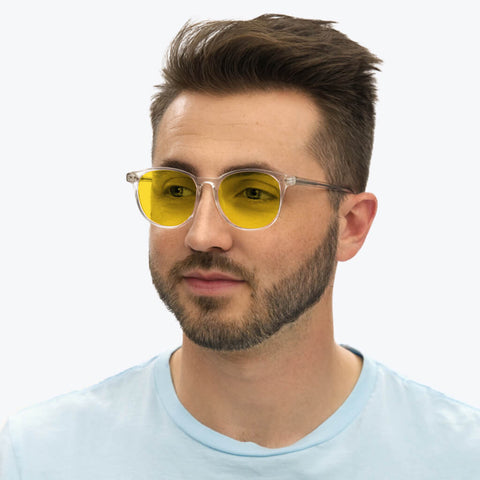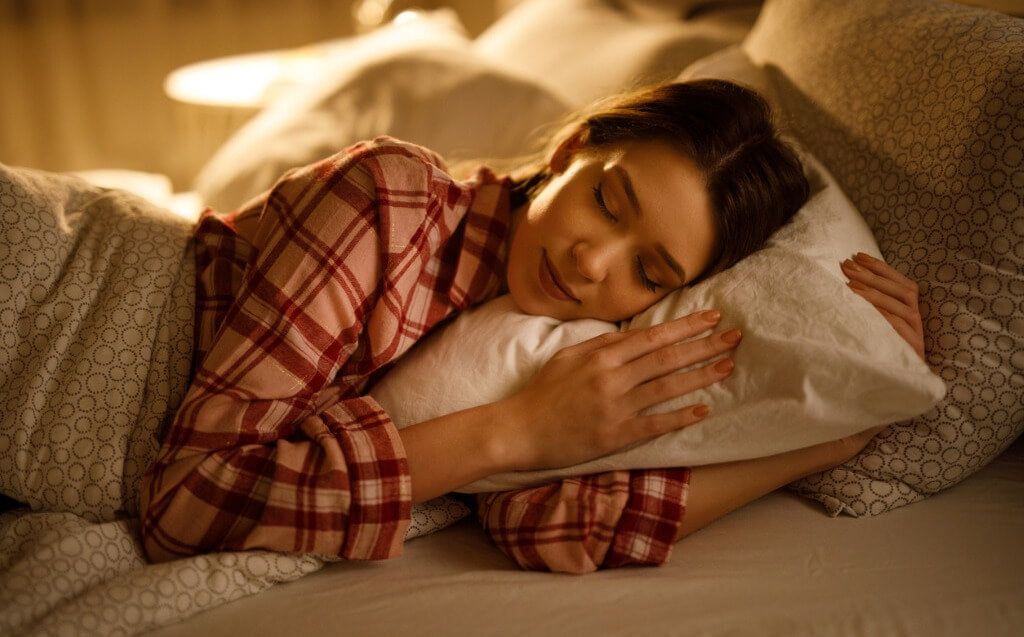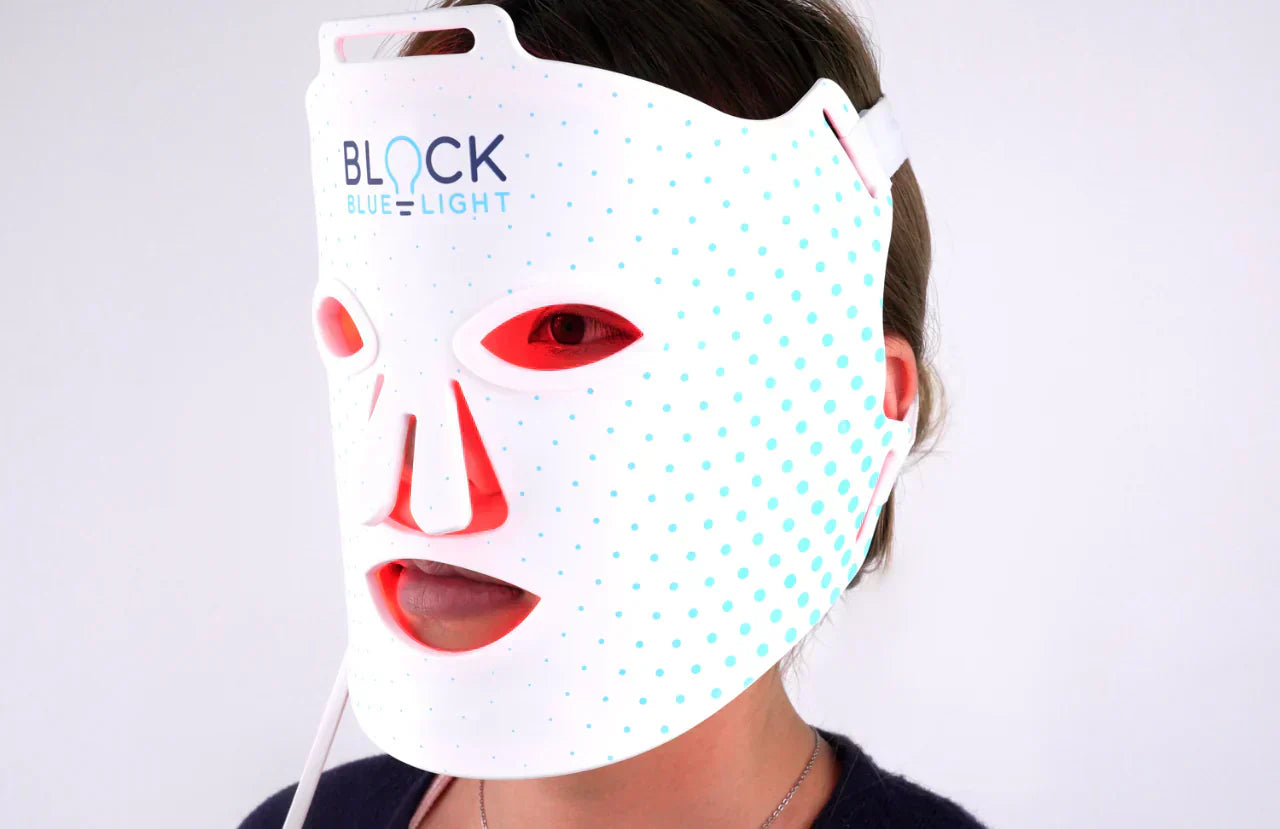If you’re a fan of good sleep (who isn’t?) then you’re in the right place. If you’re currently struggling with insomnia, or just want to know how to get into the best nourishing sleep you’ve ever had - then this article is for you.
Although sleeping is a naturally occurring bodily function, there are many things that affect the quality of sleep you have. And that, in turn, affects your health.
In this article, you will learn how to create the best environment for good sleep, which in turn affects your quality of life, mental, emotional, and physical health.
Does Blocking Blue Light Help Sleep?
Blocking artificial blue light is extremely important for healthy sleep. Overexposure to artificial blue light can cause sleep disturbances and health issues such as broken sleep, insomnia, depression, anxiety, eye strain, and more. The effects of artificial blue light reach far and wide. Artificial blue light has been linked to a variety of harmful disturbances of healthy bodily functions due to causing a melatonin hormone imbalance.
A study by NPG Aging And Mechanisms Of Disease stated that artificial blue light is quite possibly a contributing factor in cancer, obesity, diabetes, mental health disorders, premature aging, and hypertension.4 The American Medical Association (AMA) released a warning report in 2013 called; “Light Pollution: Adverse Health Effects Of Nighttime Lighting”.
The American Medical Association (AMA) states that artificial blue light exposure and LED (light-emitting diode) light exposure from any sources, including technology, at night time can not only disrupt sleep but also contribute to sleep disorders like insomnia in adults and children.4
But why does something as simple as light cause so many serious health problems for us?
The sun naturally releases blue light, and when blue light is reduced as the sun goes down it triggers the body to increase a hormone called melatonin. Melatonin is known as the sleep hormone, and it’s responsible for the sleep-wake cycle. When melatonin increases the body gets into a state of rest and relaxation to prepare for sleep. Hormones are chemical messengers which control the body's functions, and they rely on an intricate feedback system to function properly.
In the modern world, we no longer operate via the circadian rhythm and natural light. Our world is dominated by artificial light sources, 24-hour business operation, travel, and time zone hopping. And modern artificial light such as LED lights emit artificial blue light, which is the culprit for circadian rhythm disruption, hormone disruption, and subsequent health issues. Manufactured unnatural light prevents our natural feedback system from triggering our hormone system in the way it is designed. Artificial light interrupts our ability to respond normally to day and night, produce melatonin, and get a good night's sleep which is essential for optimum health.

Artificial blue light and the disruption of melatonin might not initially sound like a massive issue, but it truly is. Healthy sleep and melatonin play a huge role in body restoration and rejuvenation. The American Association for Cancer Research suggests that disruption to sleep-wake cycles may be contributing to an increased risk of breast cancer amongst other diseases.1 There is plenty of research to show the correlation between blue light exposure and health issues.
They noted that light exposure during the nighttime prevents the natural nocturnal secretion and production of melatonin. And melatonin suppresses breast cancer growth. Not only that, they found that light exposure at night can interfere with cancer treatment. Which has massive implications for people in the hospital, or at home, who are in cancer treatment. Understanding our manufactured environment and how it affects our body and wellness, is essential for rejuvenation and quality of life.
Make sure you block artificial blue light to prevent overexposure. This helps with sleep by allowing the natural rise of your melatonin. Your natural hormone rhythm is triggered by the environment and when melatonin levels are in homeostasis they will prepare your body for sleep, and ensure you sleep through the night.
How Long Before Bed Should I Avoid Blue Light?
At minimum you should avoid artificial blue light from sundown to just after sunrise. However, it is also highly beneficial to avoid overexposure during the day time too. You can minimise your exposure to artificial blue light by using blue blocking glasses and blue light blocking light bulbs in your home.
By using specially made blue light blocking products you can reduce your exposure to the most harmful blue light wavelengths that disrupt sleep. Clinical research shows that just two hours of exposure to blue light in the evening suppresses melatonin production.2 And they also found that light exposure in the morning, evening, and night time affects melatonin levels and the circadian rhythm.

Other academic research on sleep and blue light wavelength exposure suggested that sleep quality is reduced due to the reduction of deep sleep periods in the REM (rapid eye movement) sleep cycle.3 The research on blue light and sleep hygiene is ongoing, but the current research points to blue light and LED lights as dangerous contributing factors for poor-health and serious health complications.
If you are suffering from insomnia, depression, anxiety, mental health issues, obesity or a variety of other issues - blue light exposure may be contributing to your poor health. But you don’t need to worry, because there are plenty of options to help minimise your exposure and regain the balance of your circadian rhythm.
Exposure to artificial blue light can be reduced by using lightbulbs and glasses that specifically block certain wavelengths of light. This allows you to absorb the healthy natural blue light from the sun and align with your circadian rhythm. Without triggering melatonin suppression and the variety of health issues that can arise from an imbalanced hormone system. Block blue light stock a variety of lightbulbs, daytime and nighttime glasses, and other products which will support your health journey.
It’s easiest to replace all of your household light bulbs with amber or red light bulbs that block out blue light, and also purchase clear, yellow, amber, or red lens blue light blocking glasses to use with LED light emitting technology such as your laptop, kindle, tv, computer, or smartphone.
By replacing all of your household light bulbs you can rest assured that you aren’t exposed to artificial blue light during the day, evening or nighttime through LED house lighting. This prevents you from having to worry about exposure within your home or when to avoid blue light from lightbulbs before bed, as you know your lightbulbs already specifically have a blue light filter.

And there are different glasses which block blue light emissions from LED light sources. You can get daytime or nighttime blue light blocking glasses, both of which specifically block any blue light wavelengths that are released from the technology sources in your home. It is advisable to wear them whenever you are using technology that emits blue light. But especially in the early morning, evening, and nighttime. Blue light filtering glasses helps you to avoid digital eye strain from LED light sources, whilst also encouraging better sleep.
Just remember that you want to emulate the natural rise and setting of the sun. So be extra cautious of blue light wavelengths when light isn’t supposed to be illuminating the sky. And also be cautious when the sun is rising or setting. If you don’t wear your blue light blocking glasses all day, then check the sunrise and sunset times in your location so you can ensure you are synchronising your wearing times with the sun.
What Is The Best Way To Block Blue Light?
The best way to block is to use blue light blocking light bulbs combined with blue light blocking glasses. By using these two avenues of protection you can ensure that you get the best night's sleep.
Blue light blocking glasses are great to protect yourself from the harmful artificial blue light wavelengths coming from technology sources such as your tv, laptop, computer, kindle, smartphone, and gaming equipment. But they come in different lens colors and properties so it’s important to know the specifications first.
Blue light blocking daytime glasses come in clear or yellow lenses. The yellow lenses offer more protection but also have reduced visibility in comparison to the clear lenses. The Block Blue Light yellow daytime glasses offer full protection by blocking 100% of harmful blue light across the 400nm - 455nm wavelength spectrum. And they block 70% of blue light across the entire spectrum of 400nm - 500nm. The yellow lens glasses are a great option if you prefer higher protection, or if you suffer from light sensitivity and migraines.

The Block Blue Light clear lens daytime glasses are unique as they offer sleek style combined with full visibility. The clear lens daytime glasses block 50% of blue light across the entire wavelength spectrum at 400nm - 500nm. And their unique ClearBlue Lens technology ensures that 50% of the light at 455nm, which are the most harmful wavelengths, are blocked. The daytime blue light blocker glasses are perfect computer glasses for the office.
Blue light blocking nighttime glasses come in amber or red lenses. The red lenses offer the greatest protection, but also have reduced visibility in comparison to the amber tinted glasses. The red lens offers the highest protection of all blue light blocking glasses as they filter 100% of blue and green light from 400nm - 550nm. Clinical research shows that green light is also responsible for reducing melatonin secretion. And so red lenses that filter blue and green light offer the best protection for deep sleep and overall health and wellness.5
The Block Blue Light amber lens night time glasses are a great option if you prefer a bit more visibility and they still block 100% of blue light in the 400nm - 500nm wavelength range.
What Color Light Is Best For Sleeping?
The best light to prepare yourself for a deep sleep is red light. However, if you are not keen on the slight visual impairment that comes with red light then amber light is a great option. Exposure to artificial blue light can keep you up at night, and disturb your sleeping pattern by preventing you from falling into a deep sleep.
Block Blue Light stocks both amber and red blue-light blocking light bulbs and lamps, and they have slightly different qualities. The red light bulbs and lamps offer the highest protection and are best to use after sun sets. This makes them ideal for areas like the bedroom as they block 100% of blue and green light wavelengths.

Whereas the Block Blue Light amber light bulbs and lamps block 100% of blue light and can be used in areas of the home that require a little more lighting than the red light bulbs offer. You want the lighting in your home to mirror the natural light of the sun, so use the red light bulbs wherever you spend the most time prior to bedtime. This allows your body to prepare for rest by allowing optimal melatonin secretion and increase by avoiding bright light. Which in turns sets a foundation for healing, restoration, and rejuvenation through a healthy sleep cycle.
Conclusion
Blocking blue light does not have to be complicated or expensive. It’s actually pretty simple. Just invest in the best blue blocking light bulbs and blue light glasses to ensure that your body can realign with the earth's natural rhythm. There is endless research to support the worrying aspects of blue light wavelengths on human health.
If you’re looking for more information be sure to browse through our blog articles to stay updated on top science-based tips for health and wellness. We provide you with the most comprehensive information on how to improve your sleep pattern, minimise junk light, and improve quality of life through safe environments.
- https://pubmed.ncbi.nlm.nih.gov/25062775/
- https://pubmed.ncbi.nlm.nih.gov/30311830/
- https://pubmed.ncbi.nlm.nih.gov/34217920/
- https://www.ncbi.nlm.nih.gov/pmc/articles/PMC5473809/
- https://pubmed.ncbi.nlm.nih.gov/1896724/





